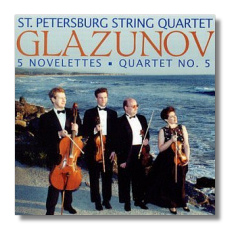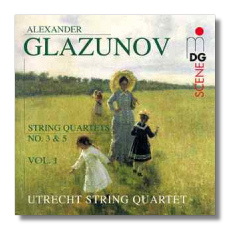
The Internet's Premier Classical Music Source
Related Links
- Glazunov Reviews
- Latest Reviews
- More Reviews
-
By Composer
-
Collections
DVD & Blu-ray
Books
Concert Reviews
Articles/Interviews
Software
Audio
Search Amazon
Recommended Links
Site News
 CD Review
CD Review
Alexander Glazunov

Music for String Quartet
- 5 Novelettes for String Quartet, Op. 15 (1886 – 30:07)
- String Quartet #5 in D minor, Op. 70 (1898 – 28:18)
St. Petersburg String Quartet
Recorded First Congregational Church, Los Angeles, June 2000
Released April 2001
Delos DE3262 58:25


Complete String Quartets – Volume 1
- String Quartet #3 in G Major "Slavic", Op. 26 (1886/88 – 28:13)
- String Quartet #5 in D minor, Op. 70 (1898 – 28:03)
Utrecht String Quartet
Recorded Doopsgezinds Kerk in Haarlem, March 2003
Released April 2004
Dabringhaus & Grimm MDG6031236-2 56:33
Summary: St. Petersburg Wins By A Head
Alexander Glazunov had a very fortunate childhood. His father was a publisher and violinist, his mother a pianist. Early on, Glazunov started playing musical instruments, and he studied under Rimsky-Korsakov and Balakirev. Further cementing his hold on a successful musical career, Glazunov formed a strong friendship with a wealthy timber merchant named Mitrofan Belyayev who formed a music publishing house to assist young Russian composers. Glazunov wrote his first symphony when only 16 years old, and he went on compose a total of nine symphonies (the last one unfinished). He composed in every form except for opera, and is most known today for the symphonies, a violin concerto, and the ballet Raymonda.
Glazunov was a music conservative to the core. The 20th century advanced, but his compositions remained steeped in the romantic era. Also, he was increasingly consumed by his penchant for alcohol. As a result, Glazunov did little composing in his last twenty years. Concerning the string quartet medium, Glazunov wrote seven string quartets, the last one in 1930.
Overall, Glazunov is likely nobody's favorite composer. He definitely does not possess the inspiration of a Tchaikovsky or Rachmaninoff, but he was an excellent 2nd tier composer based on his highly enjoyable and often folk-song melodies. In addition, he carved out a widely-known reputation as an exceptional teacher/director of the St. Petersburg Conservatory, even having Shostakovich as one of his students. Getting back to his conservative nature, there is the story of his walking out of a performance of Prokofieff's early Scythian Suite, reportedly stating that he couldn't stand all the noise. Yet, he continued to mentor Prokofieff, always giving his best to budding composers.
In accomplishing this review, I based my conclusions on the following considerations:
1. The Five Novelettes represents Glazunov's most immediately appealing music in the string quartet medium, and repeated listening does not diminish their allure. This suite was composed for one of Belyayev's numerous evenings of string quartets and makes great use of folk music all originated by Glazunov except for the Hungarian folk song of the 5th Novelette "All' Ungherese".
The first two pieces are in ternary form with a fast-slow-fast regimen. The first Novelette is titled "Alla Spagnuola", the second "Orientale"; however, don't start thinking that the titles really describe the musical settings. Glazunov was a pro at combining the Russian and Germanic styles, and each Novelette cleary reveals this feature. The fast sections are extremely delightful with slow sections having wonderful melodies and tender refrains.
The 3rd Novelette is slowish throughout and the most gorgeous music Glazunov ever penned; its counterpoint is so poignant and delicious that I feel like I'm in a trance. Further, the nobility of the music is irresistable and reminds me of Vaughan William's "Fantasia on a theme by Thomas Tallis". The disc is worth premium price for this piece alone, and the St. Petersburg String Quartet performs it exceptionally with heart-felt emotions. The 4th Novelette is a vivacious waltz, while the 5th carries a bit of the gypsy in it. I can't say enough about these pieces; they totally surprised me.
2. Glazunov's works for string quartet do not plumb any emotional depths. Playing them in a very serious or heavy manner can rob the music of its buoyancy and sweetness. Such is the case with the Utrecht's performance of the D minor Quartet. They have no problem with the earlier G Major Quartet which is more overtly exuberant, but the group gives the D minor too much weight. In comparison, the St. Petersburg Quartet's lighter and more vibrant approach fully conveys the music's lift and melodic charms. Further, the St. Petersburg displays as much drive as the Utrecht in the conclusion of the first movement and in the final movement of the D minor, clearly showing that it knows the right time to switch from lightness to tensile strength.
3. Portamento is a perfectly valid device to use in performing Glazunov's music, but the Utrecht String Quartet treats it as a poison to avoid at all costs. Their detached approach lessens the impact of the music's natural flow significantly and creates a rather dour first movement in the D minor. In contrast, the St. Petersburg's performance use portamento liberally, never losing sight of the long musical lines.
Don's Conclusions: The St. Petersburg String Quartet plays splendidly, capturing the music's exuberance, sweetness, and strength; having the Five Novelettes on the program only further enhances the disc's appeal. Although I have been rather hard on the Utrecht String Quartet concerning the performance of the D minor Quartet, there is certainly value to the disc. The group is planning to record all seven of Glazunov's String Quartets, and the only other cycle is from the Shostakovich Quartet on Olympia. Unfortunately, that fine series is no longer in print, so MD&G appears to have the field to itself as the cycle progresses. As it happens, I just received the second volume having the 2nd and 4th Quartets and will review it in the near future. In the meantime, I strongly recommend that readers first acquire the Delos disc.
Copyright © 2005/2006, Don Satz




















